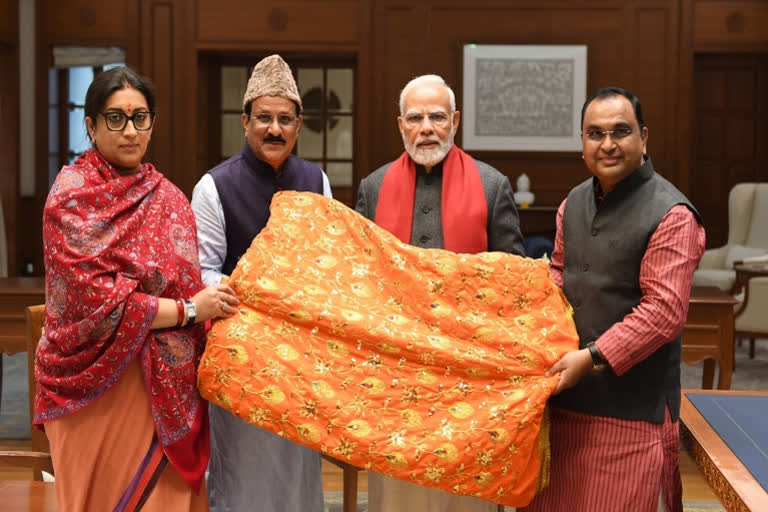New Delhi: Prime Minister Narendra Modi Tuesday handed over a Chadar that would be offered at the Ajmer Sharif Dargah on the Urs of Khwaja Moinuddin Chishti. "Handed over the Chadar which would be offered on the Urs of Khwaja Moinuddin Chishti at the Ajmer Sharif Dargah," Modi wrote on Twitter while sharing the picture of him handing over the Chadar.
-
Handed over the Chadar which would be offered on the Urs of Khwaja Moinuddin Chishti at the Ajmer Sharif Dargah. pic.twitter.com/dlLgPKxDWd
— Narendra Modi (@narendramodi) January 24, 2023 " class="align-text-top noRightClick twitterSection" data="
">Handed over the Chadar which would be offered on the Urs of Khwaja Moinuddin Chishti at the Ajmer Sharif Dargah. pic.twitter.com/dlLgPKxDWd
— Narendra Modi (@narendramodi) January 24, 2023Handed over the Chadar which would be offered on the Urs of Khwaja Moinuddin Chishti at the Ajmer Sharif Dargah. pic.twitter.com/dlLgPKxDWd
— Narendra Modi (@narendramodi) January 24, 2023
The 811th annual Urs of Khwaja Moinuddin Chishti began with flag hoisting on January 19 at the mausoleum of Khwaja Moinuddin Chisty, the leading Sufi saint of the Indian sub-continent, in Ajmer, Rajasthan. The formal religious function started with the sighting of the new moon of Rajab, the seventh month of the Islamic calendar is sighted on January 23.
The flag hoisting was done by Fakhruddin Ghori of the Bhilwara family. The procession started from Garib Nawaz Guest House located at Dargah in Ajmer after the Urs prayers. Drummers accompanied the procession and reached the dargah via the Nizam Gate from Langarkhana street. Meanwhile, the Qawwali, a special genre of music devoted to Sufism, was also played at the dargah.
Born in 1143 in Sistan (present-day eastern Iran), Khwaja Moinuddin Chishti, also known by the epithet Gharib Nawaz ('comfort to the poor'), was a Persian Sunni Muslim, preacher and Sayyid, ascetic, religious scholar, philosopher, and mystic who is revered by Muslims of the Indian subcontinent. He ended up settling in the Indian subcontinent in the early 13th century, where he promulgated the famous Chishtiyya order of Sunni mysticism. This particular tariqa (order) became the dominant Muslim spiritual group in medieval India and many of the most beloved and venerated Indian Sunni saints were Chishti in their affiliation.



